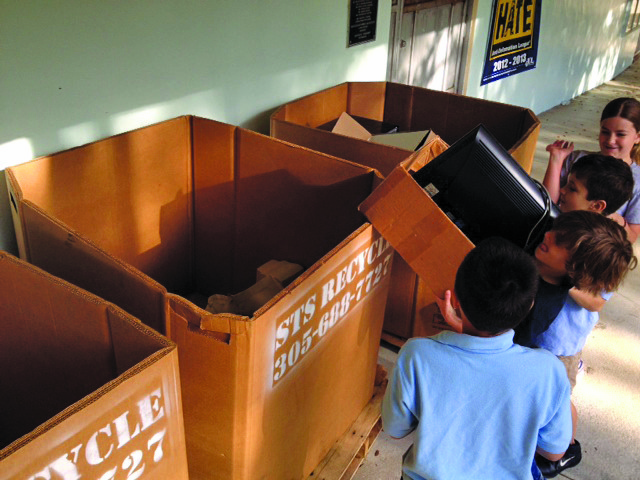Local schools go green on a daily basis.
A basic education may remain the same–reading, writing, arithmetic– but the technology that goes along with it is undergoing a major change. Chalkboard? Try Smart Board. Report cards and progress reports? Paperless. And the ubiquitous (and heavy) textbook? Now online. But aside from the technology aspects, these changes are having another impact on local schools and that’s bringing green education into the classroom.
According to local nonprofit Dream in Green, schools generally spend more money on energy costs than on books and computers combined. It was this statistic that inspired them to create the Green Schools Challenge, a program that encourages K-12 students, teachers and staff members in Miami-Dade County schools to design and implement energy and environmental solutions at their schools via “Green Teams.” And create they do. From on-site nurseries to recycling programs, local schools are taking sustainability and green initiatives to a new level. Here are some of the green programs taking hold at schools in the area:
Palmetto Middle School
Bringing their dedication to the environment to the community, Palmetto Middle is planning an open-to-the-public Earth Day event on April 22 from 4:00-7:00 p.m. The event will feature the planting of baby trees donated by Pinecrest Gardens, a used book trading post, live entertainment and FP&L solar-powered cars. Two free WE-LAB workshops (a Dream in Green and Miami-Dade Water and Sewer partner program) will help residents better understand how decreasing the demand for energy and water can positively affect air quality and improve the water supply, and the workshops will send them home with a free toolkit including shower timer, water-efficient showerhead, lead detection tablets and more.
But the middle school isn’t set on just one night of education. The event highlight will be a ribbon-cutting on a new outdoor classroom featuring PhotoVoltaic (“PV”) systems to give students and the community hands-on experience with renewable energy. The solar panels, which will allow students to observe real-time energy monitoring, will not only provide shade for the classroom, but will aid the school in saving money on energy costs. ““Palmetto Middle’s new PhotoVoltaic System is an extraordinary opportunity allowing our students to observe power generation directly from sunlight,” said PTSA President Linda Dwyer. “ It’s a prime example of the hands-on education leaping from the textbooks and into the real world that sets Palmetto Middle School as a leader in our community. As residents of the Sunshine State, it is particularly relevant that our children grasp the concept of renewable energy and learn to harness the sun’s natural power. The PMS PTSA is thrilled to support our children in gaining such a unique educational experience.”
Additionally the school’s Green Team maintains a hydroponic garden, aquatic garden, organic edible garden, and bromeliad garden, received a 2015 grant from SlowFoods, and helped PMS become an Official Watch School by transforming our Emerald Garden into a butterfly habitat.
Pinecrest Elementary School
The Pinecrest green committee isn’t afraid to get down and dirty, thanks to PTA and Pinecrest Village funding. The team, led by parents Patrick Karakadze, Teresa Albert and Rush Bowles, will install a working nursery by the school’s outdoor classroom, complete with different stages of plant cycles and greenery of all shapes and sizes. As the larger plants and trees grow they will be donated to Habitat for Humanity.
Outside of the garden, the school recently set up recycling bins in the front of the school and sent notices throughout both the school and Pinecrest Community, eventually collecting more than 2,000 lbs. of electronics that will be re-purposed rather than ending up in a landfill.
And continuing their hands-on approach, the school also plans its 2nd annual Pinecrest Elementary Biscayne Baynanza cleanup on April 25, 2015 at Matheson Hammock Park. Last year’s event brought more than 100 teachers, students and parents volunteers.
Riviera Preparatory School
Riviera’s Debby Lichtner says the school is “fully vested in keeping our campuses green,” providing full recycling for paper, aluminum cans and plastic as well as collecting and recycling toner cartridges and cell phones. The campus has also implemented tablets for every student, reducing the need for regular textbooks as the majority of books are now online. Additionally, all notes that the students take are on “OneNote,” a digital note-taking app for mobile devices that eliminates the need for paper.
Palmetto Senior High School
Under the guidance of Science Department Chair Pam Schlactman, PHS students were recently awarded a $10,000 prize in the Lexus Eco Challenge. The students, Seniors Ashlynn Dobbs, Meryl Kornfield, Emma (Renzi) Wise and Mark Hellinger and junior William Nunez came together to create a solar-powered golf cart charging station for Palmetto administration and security guards. The prize money saw $2,000 donated to the school and another $1,000 to Schlactman’s environmental science and solar classes.
South Miami K-8 Center
Motivated students brought their environmental education home at the South Miami K-8 Center. The students, about 80 over four classrooms, competed against each other for a total savings of 1,806 kilowatts of energy, a reduction in carbon dioxide emissions by 1.41 tons and an elimination of .45 tons of waste. How? The students stuck to the basics by turning off water faucets when not in use, turning off lights, limiting shower times and swapping regular light bulbs for energy-efficient versions. The teams were honored for their work by Citizens for a Better South Florida and South Miami Mayor Phillip Stoddard during a February city commissions meeting.
Palmetto Elementary School
Water bottles are the focus at Palmetto Elementary, as they begin the process of retrofitting all the school’s water fountains to fit water bottles. The school plans to record how many bottles are saved by refilling rather than tossing away. In addition to recycling and gardening, the school’s art teacher painted old campaign yard signs to label endangered plants around the campus.
Leewood K-8 Center
Leewood has been part of a recycling program through the Funding Factory since 2001, recycling not only ink cartridges, but used cell phones and small appliances, earing funding for their media center. Part of the Dream in Green initiative for the past three years, the school has held showerhead and light bulb exchanges, as well as installed a rain barrel for the school garden. Additionally, as a winner of the Samsung Solve for Tomorrow contest in 2013, they, in conjunction with Samsung, held an appliance recycling drive during which members of the school and neighborhood community were able to recycle unused and outdated technology and small appliances.
Gulliver Schools
Continuing the recycling trend, Gulliver students have found a new way to put devices to good use. Through Operation Recycle/Refurbish students refurbish computer equipment donated by school stakeholders by reformatting laptops and desktops and outfitting them with new operating systems and school-friendly software. The equipment is then donated to students in the Greater Miami area who would not otherwise have access to it. Student-driven, the school says the process has emphasized collaboration and taught students courtesy and respect for others. Additionally, students within the school are working with Moringa plants to extract nutrients from the nutrient-rich plant and create a dry-leaf/plant-based product to feed communities in impoverished countries where the plant thrives.










 Deering Estate
Deering Estate
 Massage Envy South Miami
Massage Envy South Miami
 Calla Blow Dry
Calla Blow Dry
 My Derma Clinic
My Derma Clinic
 Sushi Maki
Sushi Maki
 Sports Grill
Sports Grill
 The Healthy Kitchen
The Healthy Kitchen
 Golden Rule Seafood
Golden Rule Seafood
 Malanga Cuban Café
Malanga Cuban Café

 Kathleen Ballard
Kathleen Ballard
 Panter, Panter & Sampedro
Panter, Panter & Sampedro
 Vintage Liquors
Vintage Liquors
 The Dog from Ipanema
The Dog from Ipanema
 Rubinstein Family Chiropractic
Rubinstein Family Chiropractic
 Your Pet’s Best
Your Pet’s Best
 Indigo Republic
Indigo Republic




 ATR Luxury Homes
ATR Luxury Homes


 2112 Design Studio
2112 Design Studio
 Hamilton Fox & Company
Hamilton Fox & Company
 Creative Design Services
Creative Design Services
 Best Pest Professionals
Best Pest Professionals
 HD Tree Services
HD Tree Services
 Trinity Air Conditioning Company
Trinity Air Conditioning Company
 Cisca Construction & Development
Cisca Construction & Development
 Mosquito Joe
Mosquito Joe
 Cutler Bay Solar Solutions
Cutler Bay Solar Solutions


 Miami Royal Ballet & Dance
Miami Royal Ballet & Dance
 Christopher Columbus
Christopher Columbus
 Pineview Preschools
Pineview Preschools
 Westminster
Westminster
 Carrollton
Carrollton
 Lil’ Jungle
Lil’ Jungle
 Frost Science Museum
Frost Science Museum
 Palmer Trinity School
Palmer Trinity School
 South Florida Music
South Florida Music
 Pinecrest Orthodontics
Pinecrest Orthodontics
 Dr. Bob Pediatric Dentist
Dr. Bob Pediatric Dentist
 d.pediatrics
d.pediatrics
 South Miami Women’s Health
South Miami Women’s Health

 The Spot Barbershop
The Spot Barbershop
 My Derma Clinic
My Derma Clinic




 Miami Dance Project
Miami Dance Project

 Rubinstein Family Chiropractic
Rubinstein Family Chiropractic
 Indigo Republic
Indigo Republic

 Safes Universe
Safes Universe
 Vintage Liquors
Vintage Liquors
 Evenings Delight
Evenings Delight





 Atchana’s Homegrown Thai
Atchana’s Homegrown Thai
 Baptist Health South Florida
Baptist Health South Florida

 Laser Eye Center of Miami
Laser Eye Center of Miami
 Visiting Angels
Visiting Angels
 OpusCare of South Florida
OpusCare of South Florida

 Your Pet’s Best
Your Pet’s Best





 HD Tree Services
HD Tree Services
 Hamilton Fox & Company
Hamilton Fox & Company


 Creative Design Services
Creative Design Services